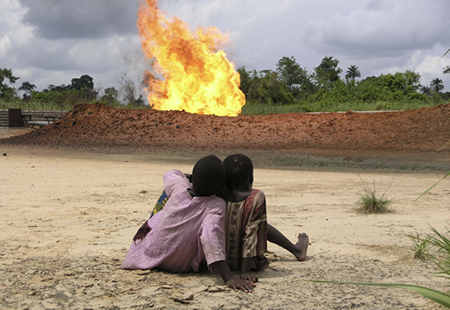There are no products in your shopping cart.
| 0 Items | £0.00 |


NIGERIA'S has been listed as one of the stop seven gas-flaring countries by the World Bank after a recent report revealed that the Niger Delta and six other nations account for two thirds of flared gas globally.
According to the World Bank’s Global Gas Flaring Reduction Partnership (GGFR)'s recently published gas flaring satellite data for 2020, these five nations has been the major pollutants for the past nine years. Apart from Nigeria, the other culprits are Russia, Iraq, Iran, the US, Algeria and Venezuela.
Published data showed that the seven countries produced 40% of the world’s oil each year but accounted for roughly 65% of global gas flaring. Way back in 2012, the World Bank’s Global Gas Flaring Reduction Partnership launched a satellite to enable it monitor pollution in the oil industry.
A world Bank spokesman said: “This trend is indicative of ongoing, though differing challenges facing these countries. For example, the US has thousands of individual flare sites, difficult to connect to a market, while a few high flaring oil fields in East Siberia in the Russian Federation are extremely remote, lacking the infrastructure to capture and transport the associated gas.”
In addition, the report said that 2020 was an unprecedented year for the oil and gas industry, with oil production declining by 8%, while global gas flaring reduced by 5%. It added that nonetheless, the world still flared enough gas to power sub-Saharan Africa.
Demetrios Papathanasiou, the global director for the energy and extractives global practice at the World Bank said: “With gas flaring still releasing over 400m tonnes of carbon dioxide equivalent emissions each year, now is the time for action. We must forge ahead with plans to dramatically reduce the direct emissions of the oil and gas sector, including from gas flaring.”
Zubin Bamji, the programme manager of the World Bank’s GGFR Partnership Trust Fund, said awareness of gas flaring as a critical climate and resource management issue was greater than ever before. He added that almost 80 governments and oil companies had committed to Zero Routine Flaring within the next decade and some were also joining the global partnership, which was a very positive development.
Mr Bamji said: “In the lead-up to the next UN Climate Change conference in Glasgow, we continue to call upon oil-producing country governments and companies to place gas flaring reduction at the centre of their climate action plans. To save the world from millions of tonnes of emissions a year, this 160-year-old industry practice must now come to an end.”
According to the report, methane emissions from gas flaring contributed significantly to global warming in the short to medium term because methane was over 80 times more powerful than carbon dioxide on a 20-year basis. Mr Bamji said gas flaring reduction projects require significant investment and takes several years to produce results.